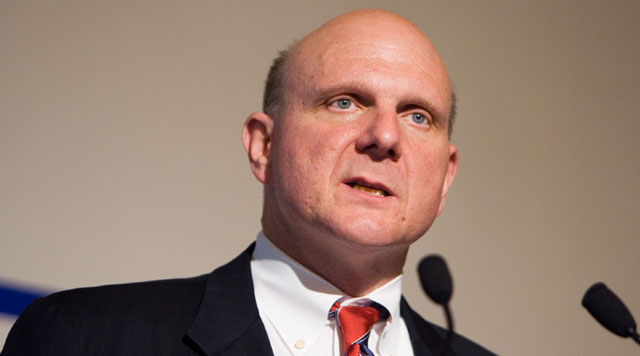 Investors cheered Steve Ballmer’s decision to step down as CEO of Microsoft. The share price leapt higher by more than 7% on the day of the announcement that he would leave within the next 12 months, once a successor had been identified.
Investors cheered Steve Ballmer’s decision to step down as CEO of Microsoft. The share price leapt higher by more than 7% on the day of the announcement that he would leave within the next 12 months, once a successor had been identified.
Most critics said that, at best, Ballmer had a chequered record running the world’s largest software company, while others said the board should have given him his marching orders years ago over missteps such as the Zune MP3 player and the company’s inability to make much headway in smartphones next to Apple and Google.
Others are even more biting in their criticism, pointing to a “lost decade” under Ballmer. That’s really overstating things. Since the Harvard University graduate took the reins from his pal Bill Gates in 2000, he has overseen a spectacular expansion in Microsoft’s fortunes.
Between 2000 and 2012, Microsoft’s revenues climbed by 220%, from US$23bn to $73,7bn. Net income in 2012, excluding a once-off goodwill impairment, was $23,2bn, up by 147% from 2000’s $9,4bn.
The share price hasn’t followed suit, but most people who criticise Ballmer for this forget that the company has paid more than $64bn in dividends in the 10 years since 2003, when it declared its maiden distribution to shareholders.
Also, when Ballmer took over, the share was hugely overvalued as a result of the Internet bubble. Microsoft’s market capitalisation peaked at $616bn in December 1999. The only other company to surpass that number — and only very briefly — was Apple in 2012.
Ballmer is easy to dislike. He’s brash, loud, volatile and in your face. He once threw a chair across his office and launched into a profanity-laced tirade when a top Microsoft engineer announced he was resigning to join Google. Ballmer bellowed about Eric Schmidt, the search engine’s CEO at the time: “I’m going to f—ing bury that guy. I have done it before and I will do it again. I’m going to f—ing kill Google.”
I interviewed a (thankfully) much calmer Ballmer in the mid-2000s. He was in South Africa to talk to customers and meet with Microsoft’s partners here. He didn’t lob any chairs around, but he was still intimidating to say the least.
I had done my homework and was armed with a list of carefully crafted questions. The interview lasted almost an hour. Throughout that time, Ballmer didn’t take his gaze from me once. And he was ready for every curveball I could throw at him.
“Who said it’s a mature product?” he barked at me when I asked how he’d convince business customers to keep upgrading their copies of Office. “Office isn’t mature,” he insisted, repeatedly refusing to entertain my suggestion that it was.
I left that interview convinced that I’d just spent time with the world’s ultimate salesman, someone driven by a burning passion to close the deal, to win big.
And that is certainly the way Ballmer has run Microsoft. Most CEOs facing a thoroughly dominant competitor like Google might choose to give up the fight and find something easier to chase. Not Ballmer. Microsoft continues to pump cash into its loss-making Bing search engine, with little or nothing to show for this investment.

To what end? Why not sell Bing to Yahoo or some other Web property and concentrate on areas where Microsoft has real advantages, like in home entertainment with its Xbox console?
Perhaps that has been the fundamental problem with Ballmer’s tenure – not his tactlessness and abrasiveness, but rather the fact that he’s a salesman first, not a technologist or innovator like Google’s Larry Page or Apple’s Steve Jobs. He wanted to take on everyone at everything, even when that wasn’t necessarily the wisest course. It led to some big hits — the Xbox comes immediately to mind, but there have been many others — along with some spectacular misses like the Zune.
To suggest that Ballmer failed is doing the man a disservice. He didn’t always make the right decisions, sure, and there’s little doubt Microsoft is facing big challenges, especially in the consumer mobile space. But whoever succeeds Ballmer is certainly not inheriting a turkey.
- McLeod is editor of TechCentral. Engage with him on Twitter
- This column was first published in the Sunday Times




